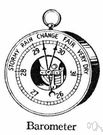atmospheric pressure
n.
Pressure caused by the weight of the atmosphere. It has a mean value of one atmosphere at sea level but reduces with increasing altitude. Also called barometric pressure.
American Heritage® Dictionary of the English Language, Fifth Edition. Copyright © 2016 by Houghton Mifflin Harcourt Publishing Company. Published by Houghton Mifflin Harcourt Publishing Company. All rights reserved.
atmospheric pressure
n
(General Physics) the pressure exerted by the atmosphere at the earth's surface. It has an average value of 1 atmosphere
Collins English Dictionary – Complete and Unabridged, 12th Edition 2014 © HarperCollins Publishers 1991, 1994, 1998, 2000, 2003, 2006, 2007, 2009, 2011, 2014
at′mospher′ic pres′sure
n.
1. the pressure exerted by the earth's atmosphere at any given point.
2. a value of standard or normal atmospheric pressure, equivalent to the pressure exerted by a column of mercury 29.92 in. (760 mm) high, or 1013 millibars (101.3 kilopascals). Also called barometric pressure.
[1655–65]
Random House Kernerman Webster's College Dictionary, © 2010 K Dictionaries Ltd. Copyright 2005, 1997, 1991 by Random House, Inc. All rights reserved.
at·mos·pher·ic pressure
(ăt′mə-sfîr′ĭk) Pressure caused by the weight of the air. At sea level it has an average value of one atmosphere and gradually decreases as the altitude increases.
Did You Know? The atmosphere that blankets the Earth gently presses down on us, and the subtle variations in this atmospheric pressure greatly affect the weather. For example, forecasters often talk of low pressure bringing rain. In areas of low air pressure, the air is less dense and relatively warm, which causes it to rise. The expanding and rising air naturally cools and the water vapor in the air condenses, forming clouds and the drops that fall as rain. In high pressure regions, on the other hand, the air is dense and relatively cool, which causes it to sink. The water vapor in the sinking air does not condense, leaving the skies sunny and clear. So if you're trying to hit a home run, would you prefer a beautiful, sunny day or one in which it looks like rain? On the overcast day, the ball has less air to push aside on its way out of the ballpark, making it easier to hit a homer.
The American Heritage® Student Science Dictionary, Second Edition. Copyright © 2014 by Houghton Mifflin Harcourt Publishing Company. Published by Houghton Mifflin Harcourt Publishing Company. All rights reserved.
ThesaurusAntonymsRelated WordsSynonymsLegend:
| Noun | 1. |  atmospheric pressure - the pressure exerted by the atmosphere atmospheric pressure - the pressure exerted by the atmospheregas pressure - the pressure exerted by a gas barometric pressure - atmospheric pressure as indicated by a barometer compartment pressure - the air pressure maintained in an air-tight compartment (as in an aircraft) overpressure - a transient air pressure greater than the surrounding atmospheric pressure; "the overpressure of the blast kills by lethal concussion" sea-level pressure - the atmospheric pressure reduced by a formula to the pressure at sea level |
Based on WordNet 3.0, Farlex clipart collection. © 2003-2012 Princeton University, Farlex Inc.
Translations
atmospheric pressure
n → Luftdruck m
Collins German Dictionary – Complete and Unabridged 7th Edition 2005. © William Collins Sons & Co. Ltd. 1980 © HarperCollins Publishers 1991, 1997, 1999, 2004, 2005, 2007